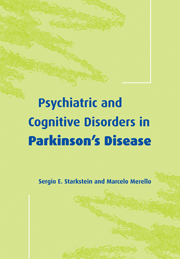Book contents
- Frontmatter
- Contents
- Preface
- 1 Introduction
- 2 Epidemiologic, clinical, and therapeutic aspects of Parkinson's disease
- 3 Parkinsonism and Parkinson's disease
- 4 Cognitive deficits in Parkinson's disease
- 5 Depression in Parkinson's disease
- 6 Anxiety, phobias, apathy, and premorbid personality in Parkinson's disease
- 7 Neuropsychologic and psychiatric side-effects of antiparkinsonian medication
- 8 Treatment of psychiatric disorders in Parkinson's disease
- Appendix
- References
- Index
Appendix
Published online by Cambridge University Press: 13 August 2009
- Frontmatter
- Contents
- Preface
- 1 Introduction
- 2 Epidemiologic, clinical, and therapeutic aspects of Parkinson's disease
- 3 Parkinsonism and Parkinson's disease
- 4 Cognitive deficits in Parkinson's disease
- 5 Depression in Parkinson's disease
- 6 Anxiety, phobias, apathy, and premorbid personality in Parkinson's disease
- 7 Neuropsychologic and psychiatric side-effects of antiparkinsonian medication
- 8 Treatment of psychiatric disorders in Parkinson's disease
- Appendix
- References
- Index
Summary
A wide variety of methods are used to assess PD, such as self-reports of parkinsonian symptoms, examiner-rated assessments, and sophisticated quantitative physiologic measurements of parkinsonian signs. Ideally, a rating scale for PD should: (1) be easy to use, (2) require a short time to administer, (3) be both valid and reliable, and (4) be predictive of further impairment. The most frequently used scales in PD are listed in the following pages.
Unified Parkinson's disease rating scale (UPDRS) (adapted from Langston et al., 1992)
This scale assesses the cardinal features of PD, the complications of treatment, and the impact of treatment on patients' mood, mentation, behavior, and activities of daily life. The UPDRS evaluates four components: (1) Mentation behavior and mood, (2) activities of daily living, (3) motor examination, and (4) complications of therapy. Scores range from 0 (normal) to 199 (worst clinical state).
- Type
- Chapter
- Information
- Psychiatric and Cognitive Disorders in Parkinson's Disease , pp. 161 - 178Publisher: Cambridge University PressPrint publication year: 2002

